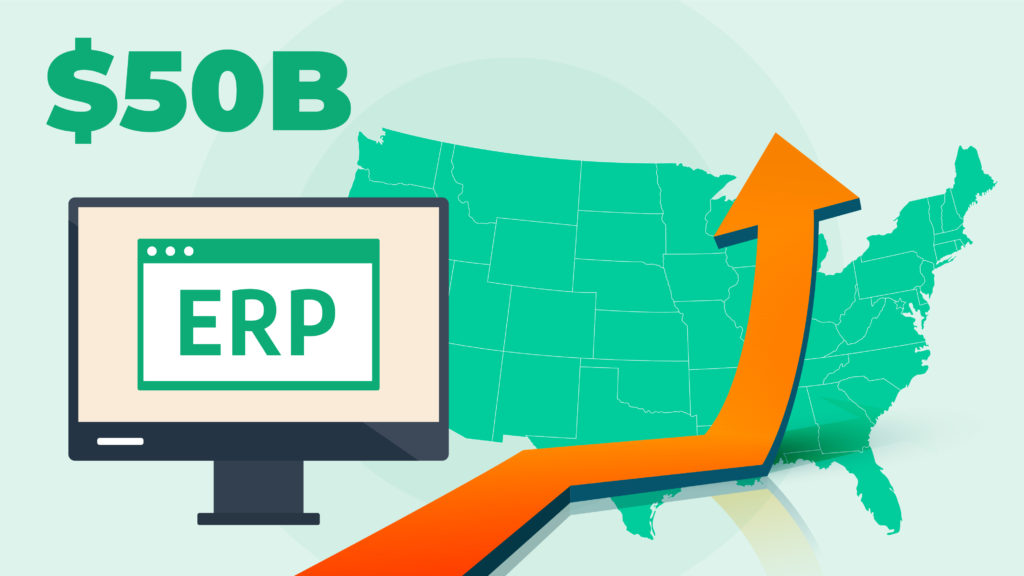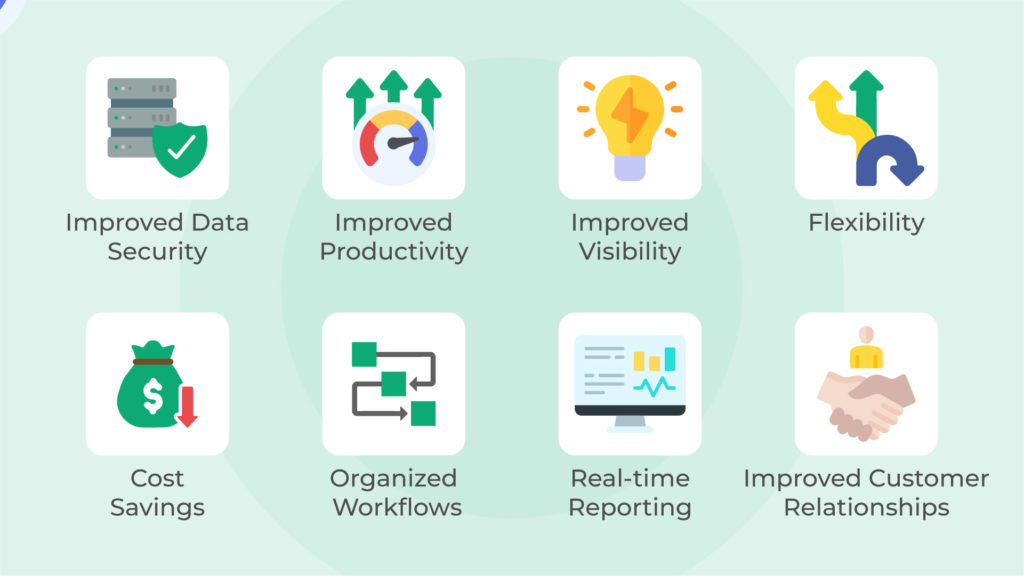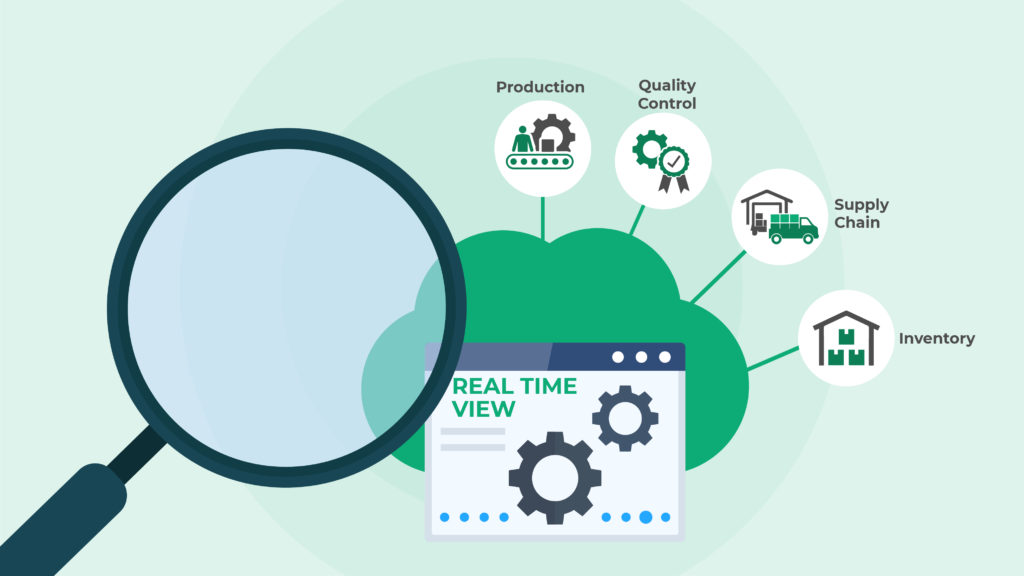Summary
- ERP systems provide numerous benefits including improved data security through centralized, secure data repositories and controlled access to reduce fraud or error risks.
- ERP tools enhance productivity via automation, enabling efficient allocation of resources, and offer improved business visibility through real-time data and analytics, aiding in informed decision-making.
- Modern ERP systems offer flexibility and scalability, enabling remote access and expansion as the company grows, leading to significant cost savings and streamlined workflows, while improving customer relationships through centralized customer data management.
Enterprise Resource Planning (ERP) tools are used to manage the day-to-day business operations in a number of industries, including procurement, accounting, supply chain management, human resources, and more. The right ERP system provides your business with an effective way of viewing, distributing, and managing its most critical resources across the entire organization.

The ERP market in the United States is worth well over $ 50 billion, and it keeps growing. But what is driving ERP adoption? In this article, we’ll look at the core benefits of ERP Software.
What Are the Primary Business Benefits of ERP Software?

ERP systems were traditionally found in the manufacturing industry, usually limited to large businesses at the enterprise level. Today, ERP tools have become much more accessible, with benefits for businesses of all sizes, across multiple industries, including:
1. Improved Data Security
Enterprise resource planning protects one of your most important assets, your data, by improving data management. Data is securely kept in one single repository instead of being spread across multiple systems with different security capabilities and vulnerability points.
As most modern ERP systems are cloud-based, it also removes the system of spreadsheets and other documents passed via email or kept on employees’ devices. Permissions can be centrally managed so that there are limits to which employees can view, access, and edit information, reducing opportunities for fraud or error.
2. Improved Productivity
A cloud-hosted ERP solution greatly enhances productivity across all essential business functions through automation of routine tasks. This is a primary benefit of any ERP software solution worth its salt. By automating basic, routine tasks and manual processes, employees save time and devote their attention to more critical tasks that bring value to the company.
Employees can complete tasks with increased efficiency, access important data in real-time, and simplify workflow processes. These changes create major cost savings as less headcount is needed to scale the business and skills are allocated to areas where it’s needed the most.
3. Visibility
The right ERP system brings visibility to the entire business through real-time data and analytics. Business leaders at every level can make faster, better, data-driven decisions with the right information and context.
By giving teams and individual contributors access to information and insight into the processes and data managed by other teams, employees are empowered to do their jobs and make well-informed decisions. Improved visibility also eliminates the time and effort that is often wasted trying to simply find information.
4. Flexibility
While enterprise resource planning software can be deployed on-premise or in the cloud, a cloud ERP system brings added flexibility to the modern workplace. Employees can access the ERP platform remotely without compromising the security of the system, which not only improves business productivity but attracts and provides access to a much wider talent pool for the organization.
Flexibility is synonymous with scalability – one of the primary benefits of an ERP is that more users and features can be easily added as the company grows and scales. A business can adopt a cloud-based ERP system to tackle the most critical functions, e.g., supply chain management or inventory controls, and then gradually expand to include accounting or people management tools. It’s possible to design an ERP system specific to an industry, company, or sector’s needs so that your ERP solution is uniquely fit for purpose.
5. Cost Savings
One of the primary business benefits of an ERP system is its ability to lower overall costs – often significantly. Automation, which we’ve already mentioned, will reduce operational costs and alleviate the administrative burden many skilled staff members have to contend with. There are other benefits, too, especially when scaling your business.
Having insight into critical business processes across the entire organization makes it easier to spot sources of excessive spending or production inefficiencies that lead to unnecessary downtime. The advanced BI capabilities of many ERP systems also enable business leaders to identify areas where returns are low and new opportunities to explore.
Additionally, inventory management and manufacturing planning capabilities can prevent rush orders, over-ordering, and over-production that drive up storage and delivery costs – all of which makes it easier to realize the ROI of your ERP system within a short amount of time.
6. Organized Workflows
An ERP system doesn’t just organize your most crucial data – it organizes and optimizes your work processes, cutting out steps and making improvements. Much like your ERP system standardizes information, it also standardizes workflows so that all departments follow the same steps and best practices. This ensures that staff operates in the most efficient and compliant way possible, simplifying training and knowledge sharing – and providing the foundation to scale quickly and profitably.
7. Real-time Reporting
Robust reporting across all functions, from sales, inventory, and procurement, to marketing and HR, is one of the biggest benefits of using an ERP system. Better reporting tools mean the ability to track the performance of every area of the business as well as any and all KPIs that matter to your business.
Unlike legacy ERP systems that can be based on batch processing of data, modern ERP systems provide real-time data tracking, which means numbers are always up-to-date and relevant. Business leaders can use the information to make immediate, well-informed decisions in a fast-moving and hyper-competitive environment.
8. Improved Customer Relationships
Customer satisfaction is crucial in every business. An ERP system can place all of the most important customer details – including contact information, order history, and support cases – in one single place, facilitating rapid solutions and a more personalized experience. Customer satisfaction is further supported by accurate inventory and order management, which means that sales can accurately state what is available and, more importantly, when their customer can expect to receive it. .
Conclusion

While most businesses will benefit from an ERP system, ERP implementation is not for the faint of heart. Choosing the right ERP software provider is complicated, and the stakes are high. You need an ERP provider that understands the solution (and your business) inside and out.
At 10X ERP, we’re here to not just provide the software to exponentially scale your business but to provide the best implementation experience in the market. Let us show you how we’ve modernized ERP software for distributors and reinventing the implementation process!
